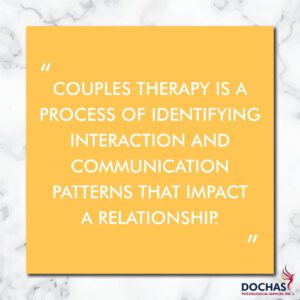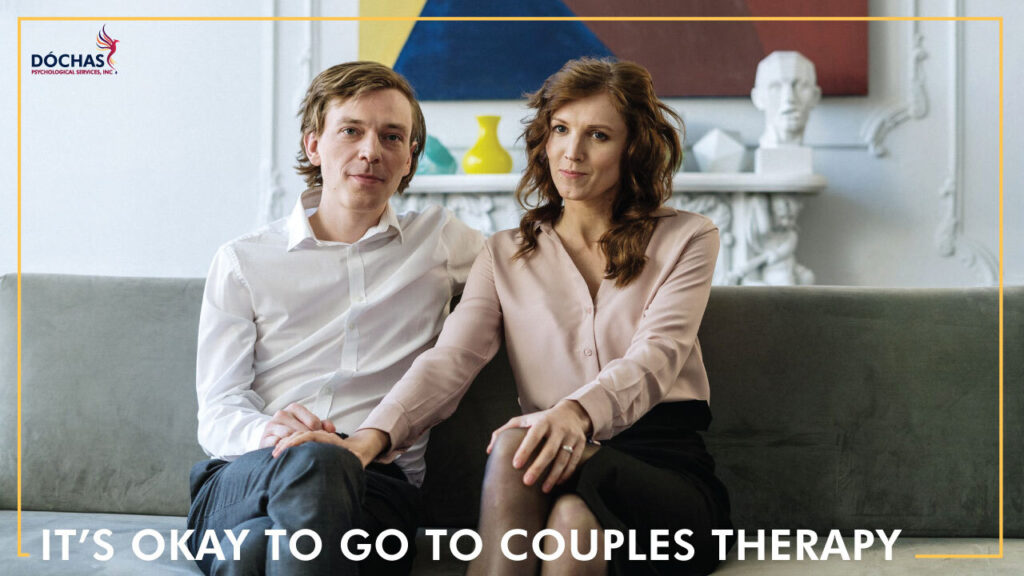Hello! It’s Pooja and Paula here this week on the Dochas blog. Today we wanted to talk about why it’s okay to go to couples therapy. Sometimes there is this idea that couples therapy is only for couples who have “problems,” and to go to therapy means there’s something that needs to be fixed. But actually, therapy can help with every aspect of your daily lives. Sometimes you need a little help navigating specific experiences, and your therapist has an experienced perspective that can guide you. This includes in your relationships!
But even though we would encourage everyone to make use of therapy, we want to explain what it is and what to expect when you go to couples therapy. That way, you know what you might learn through couples therapy.
What is couples therapy:
Couples therapy is a process of identifying interaction and communication patterns that impact the friendship, intimacy, and the fulfillment of needs of one or both partners in a relationship. In our day-to-day lives, our patterns of interaction can be so familiar that we don’t see them. This is where therapy can be helpful.
During couples therapy, each partner is invited to openly share their experience, explore their communication and interaction styles, and try different strategies to communicate and interact. The outcome of the therapy may be increased satisfaction with the partnership or increased clarity about the decision to part ways.
There are benefits to couples therapy: you may experience improvement in your relationship, a deeper awareness of your relationship, increased intimacy with your partner, or new ways of resolving relational issues through new communication and interaction styles.
Therapy is not always easy, though. You may encounter uncomfortable issues; emotions may emerge that feel overwhelming, and your relationship may change as a result, and have a different outcome than you expected.
Both of you and your therapist can work together to manage concerns that may arise during the therapeutic process. When you attend couples therapy sessions, you as a couple are “the client”.
We’re going to list some examples of when to seek out couples therapy, so you can see it can be used in all kinds of life situations. If you fit into one of these examples, therapy might be something to consider. But even if you don’t fit into any of these boxes, therapy is not restricted to people going through specific experiences. If you feel the need for some help and guidance in your relationship, you can reach out to take advantage of couples therapy at any time.
When to seek out couples therapy proactively:
- Getting married
- Blending families
- Honouring cultural differences
- Issues surrounding LGBTQ2+
- Becoming parents
- Raising children with special needs; or that are going through significant milestones (toddler, teenager)
- Empty nest
- Caring for aging parents
- Coping with a loss
- Moving in together/ relocating
- Changes in employment or financial status
- Coping with health concerns
What you might learn during couples therapy
First, you might learn different strategies of communication to use in your relationship. You can learn about what a healthy loving relationship can look like in your specific situation.
You might learn about different frameworks that might be helpful to understand your relationships, such as love languages or attachment styles.
You can learn about emotional regulation (such as self-soothing and co-regulating), so you can better navigate the emotions that come up in a relationship. And you can learn about conflict resolution, so you can get through areas of disagreement. Another concept you might cover is how to become interdependent (in other words, how to honour my own needs as well as my partner’s).
These are just some of the tools you might learn about during therapy, which can help you navigate your relationship.
The role of the therapist during couples therapy
During couples therapy, the therapist does not take a side, and is not biased towards one partner or the other. The client is essentially the relationship and not either person. The therapist will hold space to help you to deepen your understanding of what your dilemmas in the relationship are.
 Now that you know a little bit more about couples therapy, we hope you are more comfortable with what it is. Hopefully you learned that you don’t have to wait until you think you have a big enough “problem,” but you can reach out for a different perspective at any time. If you’d like to know more about it, you can reach out to us here at Dóchas Psychological Services. You can get in touch with us by calling us at 780 446 0300 or emailing info@dochaspsych.com.
Now that you know a little bit more about couples therapy, we hope you are more comfortable with what it is. Hopefully you learned that you don’t have to wait until you think you have a big enough “problem,” but you can reach out for a different perspective at any time. If you’d like to know more about it, you can reach out to us here at Dóchas Psychological Services. You can get in touch with us by calling us at 780 446 0300 or emailing info@dochaspsych.com.
About Dóchas Psychological
Dóchas Psychological Services is a well-established and trusted therapy clinic located in Spruce Grove, Alberta. At Dóchas we value the idea that everyone deserves a safe space. Through connection and education, our team works hard to build a trustworthy relationship with each of our clients. It is our goal to create a community for our clients to feel like they belong.
Disclaimer
Information provided through Dóchas Psychological Services blogs or vlogs is meant for educational purposes only. They are NOT medical or mental health advice. You can read more about our disclaimer here.

